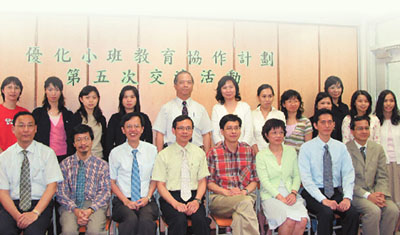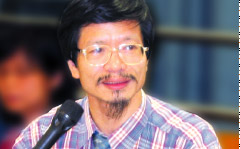


|
||||
 |
||||||||||||

|
|
|||||||||||

| HKIEd working hand in hand with
the school community The Co-operative Learning project at Sung Tak School is one of the many collaborative activities organised under the "Partnership for Small Class Teaching Developments Scheme". |
| Dr Chan Kam-wing remarked,
"Co-operative learning turns individual discrepancies into learning
opportunities." To align with the curriculum reforms, the "Partnership for Small Class Teaching Development Scheme" explores the impact of different teaching strategies on the effectiveness of students' learning. One of the proposed strategies is the "Co-operative Learning" model. Dr Chan Kam-wing, Lecturer in the Department of Curriculum and Instruction, has provided advice on the setting up of a trial model for Sung Tak School since the second term of 2002-2003. Mr Lee Meng-ching, the Principal expressed the hope that in his school the model would achieve the dual purpose of promoting students' learning while enhancing teachers' professional development, through their involvement in the collaborative project. Commenting
on Co-operative Learning, Dr Chan Kam-wing stressed that it could advance
the development of students' generic skills, particularly in the areas
of collaboration, communication and studies. The learning model also
enables students to cultivate a positive life-attitude and a cordial
inter-personal relationship with others. Facilitated by heterogeneous
groupings, where pupils of different ability levels are mixed in one
group, the arrangement encourages group members to learn the importance
of cooperation and mutual assistance. |
||
The amicable inter-personal relationship helps students of various ability levels achieve their learning targets. Dr Chan further pointed out that the application of the model had turned individual discrepancies, traditionally viewed as obstacles to learning, into an effective tool to enhance learning.
|
 |
|